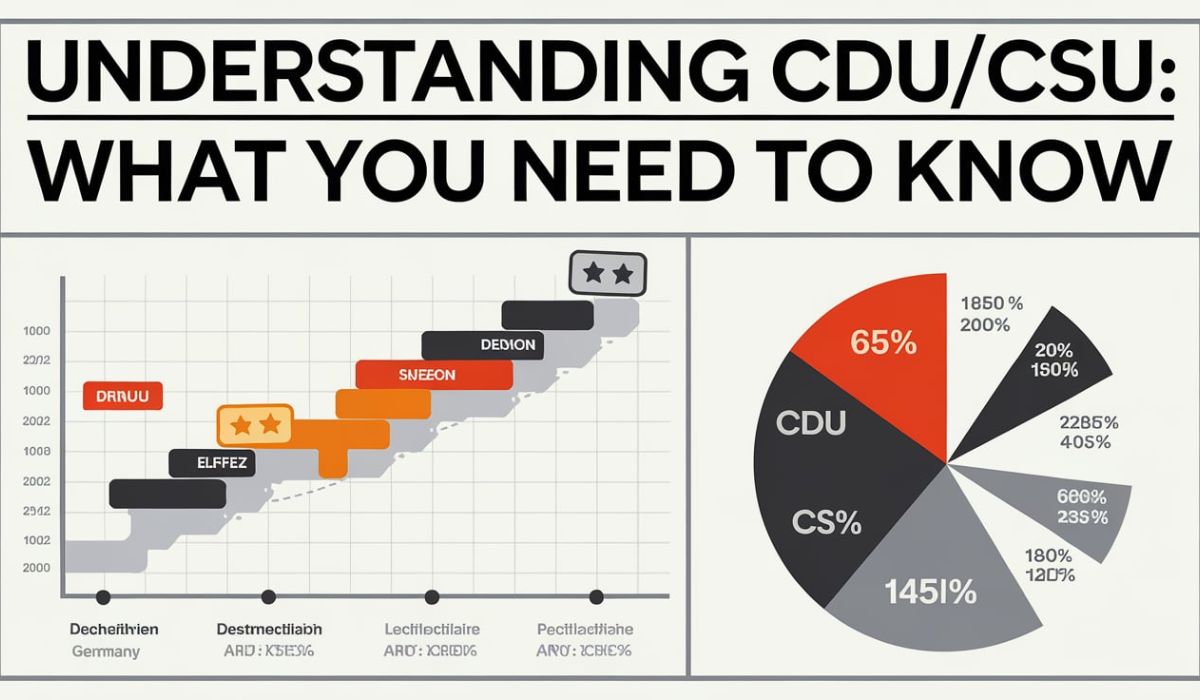In the world of politics, especially in Germany, CDU and CSU are two terms that frequently come up. But what do they really mean? If you’re someone unfamiliar with these terms, you might be wondering how they influence the country’s political landscape. Let’s break it down in the simplest way possible, so that you can walk away with a clear understanding of the CDU/CSU alliance and its role in Germany’s politics.
What is CDU/CSU?
If you’ve ever heard the terms CDU and CSU, you’ve probably wondered what they stand for and why they’re important. Well, CDU stands for Christian Democratic Union (Christlich-Demokratische Union), while CSU refers to the Christian Social Union (Christlich-Soziale Union). Both of these parties are major political forces in Germany, but here’s the twist: they are distinct entities that have formed an alliance.
The CDU is a center-right political party, while the CSU is its Bavarian counterpart. They typically join forces to form a unified front in national politics, particularly in the federal parliament.
But why the separation? Despite being closely aligned ideologically, the two parties are geographically distinct. The CDU operates across Germany, whereas the CSU is only active in Bavaria. However, they often come together on national matters, especially during elections.
The Origins of CDU and CSU

To understand why these two parties are so closely linked yet remain separate, let’s go back in time. The Christian Democratic Union (CDU) was founded after World War II as a party to promote Christian values and democracy. Its goal was to create a center-right platform that could appeal to a broad spectrum of voters, uniting various factions, including Catholics, Protestants, and even former members of the conservative German Democratic Party.
On the other hand, the Christian Social Union (CSU) was created a bit earlier, in 1945, specifically to represent the interests of Bavarians. While the CSU shares many core beliefs with the CDU, its primary focus has always been on regional matters. The two parties decided to join forces to create a stronger political presence at the national level while retaining their separate identities.
How the CDU and CSU Work Together
Even though the CDU and CSU are separate political entities, they often work hand-in-hand on a variety of issues. This collaboration is particularly strong when it comes to national elections and the formation of a government.
While the CDU typically leads the charge on the national stage, the CSU remains focused on Bavarian interests. However, they share a common platform that is heavily influenced by Christian values, free-market capitalism, and social conservatism.
One of the most important aspects of the CDU/CSU relationship is the fact that they often present a unified front in elections, even though they maintain separate party organizations. In fact, they frequently run candidates under the banner of the Union (the CDU/CSU alliance), which helps them maximize their collective political power.
The Political Influence of CDU/CSU in Germany
Together, the CDU and CSU represent one of the most powerful political coalitions in Germany. For decades, the Union has been a dominant force in German politics. They have produced numerous chancellors (the head of government) and consistently maintained a strong presence in the Bundestag, the German parliament.
But the influence of CDU/CSU is not just limited to national politics. The Union is also an important player in regional affairs. In states like Bavaria, where the CSU has significant political control, they can push their agenda and shape policies that affect not only their region but also the entire country.
What is the Role of CDU in Germany?

The CDU has historically been the leading party within the CDU/CSU alliance. As a national party, it seeks to represent voters from all parts of Germany, not just one region. The CDU is often seen as a moderate conservative party, balancing traditional Christian values with economic liberalism.
Under the leadership of influential figures like Angela Merkel, the CDU has helped shape Germany’s approach to the European Union, immigration, and fiscal policy. The party has also been a strong advocate for economic growth and stability, emphasizing free-market capitalism, job creation, and social welfare programs.
What is the Role of CSU in Germany?
The CSU is a political party that is primarily active in Bavaria, the largest state in Germany. While the CSU shares many values with the CDU, it tends to take a more conservative approach on issues like immigration and family policy.
Due to Bavaria’s unique history and cultural identity, the CSU often seeks to protect local traditions and push policies that favor Bavarians. They are particularly vocal when it comes to regional autonomy and ensuring that Bavarian concerns are heard at the national level.
Key Political Figures of CDU/CSU
Over the years, both the CDU and CSU have produced many prominent figures in German politics. Angela Merkel, the former Chancellor of Germany, was a member of the CDU, and her leadership style defined Germany’s political landscape for over a decade. She helped guide Germany through some of the toughest crises, including the European financial crisis and the refugee crisis.
On the CSU side, Horst Seehofer was a notable figure, serving as the Minister of the Interior and later as the leader of the CSU. He is known for his strong stance on immigration and has played a crucial role in shaping Bavarian policy.
The CDU/CSU Relationship with Other German Parties

While the CDU/CSU alliance is dominant, they often have to cooperate with other parties in order to form a government. One of the most important relationships is with the Free Democratic Party (FDP), which tends to align with the CDU on economic issues.
At times, the CDU/CSU has also cooperated with the Social Democratic Party (SPD), particularly when forming a coalition government in the Bundestag.
CDU/CSU’s Economic and Social Policies
Both the CDU and CSU advocate for a strong market economy and fiscal discipline. Their economic policies are centered around free trade, low taxation, and entrepreneurial freedom. They emphasize job creation, tax relief for businesses, and reducing bureaucracy to encourage economic growth.
On social issues, the CDU/CSU combine traditional Christian values with a center-right approach to social welfare. They support family values, Christian ethics, and personal responsibility in society.
Challenges Facing the CDU/CSU Today
Despite their long-standing dominance in German politics, the CDU/CSU face numerous challenges in modern times. Rising populism, especially from the Alternative for Germany (AfD) party, has posed a threat to their hold on power. Additionally, debates around climate change and migration have caused divisions within the Union.
The CDU/CSU must also deal with internal disagreements over how to balance conservative values with the demands of a modern, diverse society.
The Future of CDU/CSU in German Politics
Looking ahead, the CDU/CSU will have to adapt to changing political dynamics. As the world becomes more interconnected, and Germany faces new challenges such as climate change, the future of the CDU/CSU will depend on how effectively they can address issues like immigration, technology, and social welfare.
Despite the challenges, the CDU/CSU remains a formidable force in German politics. Their ability to unite various factions within the country and maintain a strong presence in the Bundestag will continue to shape Germany’s future.
CDU/CSU’s Stance on European Union Policies
The CDU/CSU have traditionally supported European integration and have been strong advocates for the European Union (EU). They view the EU as crucial for maintaining peace and prosperity across Europe. Their stance on the EU has been largely favorable, advocating for policies that promote trade, security, and economic cooperation among European nations.
The CDU/CSU’s Approach to Immigration
Immigration is one of the most controversial topics in German politics today, and the CDU/CSU’s approach has evolved over time. Historically, both parties have supported controlled immigration, but their views on refugees and asylum seekers have varied.
The CSU, in particular, has been more critical of accepting large numbers of refugees, while the CDU has taken a more balanced approach, advocating for integration programs and responsible immigration policies.
Why Should We Care About CDU/CSU?
You may be wondering why you should care about the CDU/CSU if you’re not German or involved in politics. The truth is, the decisions made by this alliance have a broad impact on European and global politics. With Germany being the largest economy in Europe, the policies of the CDU/CSU shape not only Germany’s future but also that of the entire European Union.
Conclusion: The Impact of CDU/CSU on Germany
The CDU/CSU alliance is at the heart of Germany’s political system. While these parties may have different focuses, their collaboration has shaped the country for decades. Whether it’s economic policies, immigration debates, or relationships with other countries, the influence of the CDU and CSU can’t be overstated.
As Germany continues to evolve, so too will the CDU/CSU. It’s essential for both Germans and outsiders to understand the role this alliance plays, as their decisions continue to affect not only Germany but the entire European Union.
FAQs about CDU/CSU
What is the main difference between CDU and CSU?
The CDU operates nationwide, while the CSU is only active in Bavaria. Despite this, both parties often work together to influence national politics.
How does CDU/CSU impact European Union policies?
CDU/CSU are strong supporters of European integration and influence EU policies by advocating for economic cooperation, trade, and security within the Union.
Why is the CDU/CSU alliance important in German politics?
The CDU/CSU coalition has been a dominant force in Germany for decades, shaping policies on everything from the economy to social issues.
How does the CDU/CSU view immigration?
While the CDU takes a balanced approach to immigration, the CSU tends to be more conservative and critical of large-scale immigration.
What challenges do CDU/CSU face today?
The rise of populism and internal disagreements over issues like climate change and migration are some of the challenges facing the CDU/CSU today.
